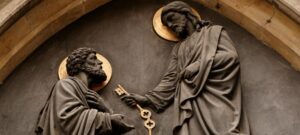Contra Sede: errors of Vatican II do not rise to the level of dogmatic negation...this sort of thing has happened before....For me, the most relevant episode in comparison to Vatican II is the Council of Constance during the Great Western Schism. This validly-convoked council eventually obtained the disposition of all three simultaneous claimants to the papacy, and the installation of a valid and universally accepted one. But before that, the council in 1415 promulgated the heresy of Conciliarism (Haec Sancta), which does indeed violate at least two infallible dogmas. This error was not corrected until a hundred years and three popes later. None of those men were considered antipopes, and no one thought the Church had apostatised. The backstop of the Petrine Promises came in the form of the Holy Ghost preventing the proper implementation of plan as was laid out in the document”Frequens” which determined the frequency of councils going forward as having the primacy of jurisdiction over the Church. Again, no one went Sede, no one claimed the Church apostatized. People simply waited, and it was eventually corrected.
Q&A: So why is “FtR” Prevost an Antipope, but John XXIII, Paul VI, JPI, JPII and BXVI were valid popes? In other words, why has the Petrine See been vacant only since 31 December ARSH 2022 and not since ARSH 1958?
It’s apropos that this is being posted on day 1000 of the current interregnum, as we can see on the counter on the sidebar.
NonVeni Mark gets the credit on this one, as he wrote the answer. NonVeni Mark is one of the most eloquent and accessible exponents today of the argument as to why the post-Vatican II popes were valid, albeit really, really bad, and therefore the Petrine See has only been vacant for 2 years and 9 months and counting, NOT 67 years.
Again, I didn’t write the answer to this Q&A, NonVeni Mark did, so please credit him accordingly. —-Alpha Bravo
Question:
Dear Ann and the Gang,
While I can agree that Prevost cannot be Pope based on what he is saying, the thing that bothers me is the reasoning you are using to make the case: how does it substantially differ from the arguments made by the sedevacantists who say there has been no valid Pope since Pius XII or John XIII?
If you rely on “heresy disqualifies or takes away any office” then how can you accept any of the Popes after Pius XII?
Sincerely yours,
P
Answer (written by NonVeni Mark): I believe the answer is that none of post-conciliar, pre-Bergoglian popes ever denied an infallibly defined dogma of the faith.
The errors of Vatican II do not rise to the level of dogmatic negation, and the council itself declared that it defined no new dogma. Of the errors that do exist, some are a matter of interpretation (Dignitatis Humanae, Lumen Gentium), and some are indeed more serious and opposed to perennial teaching (Nostra Aetate). Our faithful assumption is that these errors will be corrected in due time, because… this sort of thing has happened before.
The most famous case is that of the omission of the Filioque in the Nicene Creed, something that wasn’t corrected for 700 years, at the cost of schism. Surprisingly, this does not rise to the level of dogmatic error, because none of the various creeds are considered infallible.
For me, the most relevant episode in comparison to Vatican II is the Council of Constance during the Great Western Schism. This validly-convoked council eventually obtained the disposition of all three simultaneous claimants to the papacy, and the installation of a valid and universally accepted one. But before that, the council in 1415 promulgated the heresy of Conciliarism (Haec Sancta), which does indeed violate at least two infallible dogmas. This error was not corrected until a hundred years and three popes later. None of those men were considered antipopes, and no one thought the Church had apostatised. The backstop of the Petrine Promises came in the form of the Holy Ghost preventing the proper implementation of plan as was laid out in the document”Frequens” which determined the frequency of councils going forward as having the primacy of jurisdiction over the Church. Again, no one went Sede, no one claimed the Church apostatized. People simply waited, and it was eventually corrected.
Aside: The current heresy of Synodality is much worse, of course, because it uses the model of Conciliarism but extends the ruling body to the non-ordained, violating still other infallible dogmas. A laymen attempting to wield ecclesiastical jurisdiction is a heretic by Divine Law.
(Everything in the above answer was written by NonVeni Mark.)

Comments